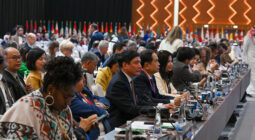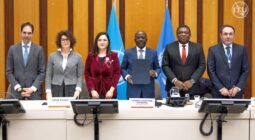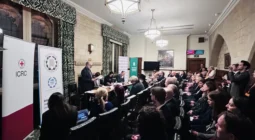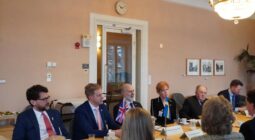

Delegation to Indonesia discuss need for collaboration on defence and increasing trade
A BGIPU cross party delegation visit to Indonesia took place during the February recess between 15 and 21 February with representatives from both Houses of Parliament. As delegation leader I was joined by John Slinger MP, Chris Webb MP, Graham Stuart MP, Baroness Northover, Lord Rennard and Joe Perry from the BGIPU secretariat.
The key objectives of the Parliamentary delegation were to meet with counterparts from the Indonesian Parliament and Government to gain a better understanding of Indonesia’s strengths and challenges at a regional and global level.
The delegation arrived in Jakarta on Saturday 15 February, with the majority of our meetings taking place in the capital, although Indonesia is an archipelagic nation with up to 17,000 islands and a population of 280 million people spread across 38 provinces.
The UK has a long-standing relationship with Indonesia dating back 75 years. In November 2024 newly elected President Prabowo Subianto visited the UK, meeting with HM The King and the Prime Minister. A joint statement between the PM and President was issued to sign a new Strategic Partnership in 2025. The meetings and discussions that took place during the delegation visit focused on improving bilateral relations between the UK and Indonesia, particularly around security, trade, investment, climate change, science/education and foreign policy.
We had a varied and diverse programme of meetings and events during our time in Indonesia, starting with a very informative cultural day starting with an immersive journey through time exploring the various aspects of Indonesia’s history and development at the national museum. The Isitiqlal mosque connected by an underground tunnel to the Jakarta Catholic Cathedral is the largest mosque in SE Asia and the 9th largest in the world, able to accommodate 200,000 worshipers. Our cultural day ended with a boat ride around the Taman Wisata Alam Mangrove Reserve, an oasis in the middle of the city. We each contributed to the sustainability of the mangrove reserve by planting a tree.
The British Ambassador to Indonesia, Dominic Jermey, met with us on Monday morning to provide a very informative and helpful briefing centred around “the 4 P’s” – prosperity, planet, peace and people – which helped to guide our discussions throughout our visit.
Our first formal meeting was with Budi Djiwandono, chair of the Gerindra Party, at the House of Representatives. He discussed an ambitious programme to grow the economy and improve life chances for Indonesia. Integral to this improvement is the President’s national free meal programme, with the intention of providing healthy nutritious meals to over 82m children and pregnant women by 2029 to reduce malnutrition and stunting. It is anticipated the programme will meet a number of the government’s key objectives, with transformative investment for people and the economy, producing long term health and educational benefits, creating jobs and sustainable income. However the cost is estimated at $28BN per year – seen by some as unaffordable and unsustainable.
While UK trade with Indonesia has reduced, in comparison trade with the EU has increased. We discussed trade and defence with government representatives, with Indonesia seeking support from the UK with the OECD accession process to become the first South East Asian nation to apply for full membership. The country applied to join CPTPP in September 2024. At the meeting with the Defence Minister, H.E. Lieutenant General (Rtd) Sjafrie Sjamsoeddin, we discussed the potential for the UK to supply Indonesia with frigates as well as fishing vessels.
The meeting with the Minister for Investment and Downstreaming, H.E. Mr Rosan Perkasa Roeslani, discussed the extraction of critical minerals and the importance for the economy of producing goods and attracting inward investment, including from the UK.
Indonesia is currently developing strong links with UK higher education institutions and we had the opportunity to visit the new Deakin/Lancaster University campus in Bandung, a partnership between these two Australian and British universities. Students have the opportunity to undertake undergraduate programmes from Deakin and Lancaster without leaving Indonesia.
Human rights was an issue discussed prior to our visit, and at the meeting with the National Human Rights Commission we asked direct questions about whether the situation had improved, including in Papua. No direct answer was provided.
The British Council has been operating in Indonesia for many years, predating diplomatic relations by 2 years, producing arts, culture and education programmes. We visited the Council’s offices and were entertained by recipients of the Connections Through Culture grant programme.
We had dinners with Chevening scholars and the Westminster Foundation for Democracy, which provided great opportunities to hear directly what they thought were the challenges and strengths of the Government.
In conclusion we covered a lot of areas during our visit from Monday- Friday, with a number of actions to be delivered on our return. I would personally like to thank all of the delegates for an enjoyable and productive visit, the FCDO for briefings and Joe Perry for keeping us all on track and having a laugh along the way.
















